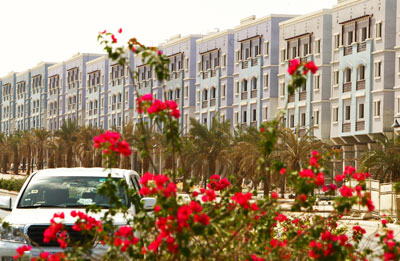The residential sector in the Saudi capital Riyadh has witnessed significant activity levels in 2019, according to new data released by global real estate consultancy firm CBRE.
The report reveals that the volume and value of transactions have increased in the Saudi capital by 53 percent and 63 percent respectively year-on-year.
Meanwhile, residential mortgages for individuals in the kingdom recorded a growth rate of more than 250 percent in terms of the number of contracts signed from January to November 2019.
Figures also demonstrate that the value of contracts rose by more than 160 percent in the same period year-on-year, it stated.
According to CBRE, the Saudi residential sector has been further bolstered by continued government support.
Last October, the Ministry of Housing launched an initiative to support residential renovations by providing financing for housing units that are over 15 years old.
This will likely result in higher activity among existing aging stock within the central districts of Riyadh, stated the property expert.
CBRE’s study also reveals that beneficiaries of the Saudi Ministry of Housing’s ‘Sakani’ initiative aimed at increasing the national rate of homeownership has increased by 14% in 2019, compared to the previous year.
As of the end of 2019, the capital’s residential supply stood at 1.29 million residential units with an expected delivery of 111,000 additional units by 2023, it added.
In the office sector, CBRE said co-working and flexible office working structures have continued to disrupt the global office markets, and in Riyadh too they are expected to reshape the office leasing market.
The kingdom’s unemployment rate declined in Q3 last year to 12 percent – down from 12.8 percent in the same period in 2018.
These unemployment rates are expected to continue to decline in the short-term, with a positive impact expected in terms of increased potential office demand, stated the property expert in its report.
Construction on the Riyadh metro continued to progress in 2019, with operations expected to commence this year.
Upon completion, real estate in proximity to key transport hubs will benefit from enhanced accessibility and connectivity.
King Abdullah Financial District is also expected to play a pivotal role in upgrading the capital’s office market. The iconic project will provide a number of Grade A office towers aimed at cementing the district as a local, regional and global financial hub.
According to CBRE, the commercial real estate sector is also due to be further stimulated by increased investment and business activity, as evidenced in the announcement of a number of projects, with a total investment of more than $15 billion during the third edition of the Future Investment Initiative in 2019.
Total office stock in Saudi Arabia’s capital stood at 4.3 million sqm of gross leasable area (GLA) in the last quarter of 2019 with an additional 1.66 million sqm GLA expected to be delivered by 2023, it added.
TradeArabia News Service
29/01/2020






















































